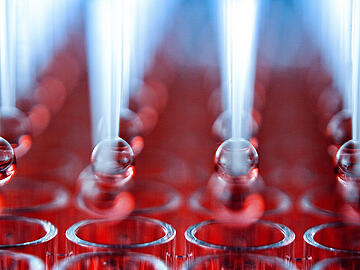
Automated High-throughput Transformation of Bacteria Cells Application Note · CyBio FeliX
Introduction
Bacterial transformation is the process by which foreign plasmid DNA is introduced into a bacteria cell. The transformation of DNA into bacteria cells, such as Escherichia coli (E. coli), is an essential molecular biology technique used for both the study of bacteria itself and also for the storage and/or replication of plasmids. To enable bacterial transformation, DNA plasmids are typically designed to contain a bacterial origin of replication (ORI) and an antibiotic resistance gene, for use as a selection marker.
One simple method for the transformation of plasmid DNA into bacteria cells is to use heat shock. Plasmid DNA is added to competent bacteria cells and incubated in the cold. The cells are then heated to a high temperature for a short amount of time before being returned to the cold. This ‘heat shock’ enables the transfer of the plasmid DNA inside the bacteria cell. After recovery in media, cells containing the plasmid DNA of interest are ready to be grown, typically on solid agar. Through the addition of antibiotics to the agar, antibiotic selection can be used to select for those cells which have been successfully transformed with DNA.
The transformation of bacteria cells typically remains a manual, low-throughput activity in molecular biology laboratories. The ability to transform bacteria transformation in a high-throughput, automated manner would greatly aid laboratories looking to increase their throughput and improve the robustness and reproducibility of their experiments. The CyBio® FeliX offers a compact pipetting platform for performing the liquid handling steps required for a high-throughput transformation method. When used on an automation platform alongside a thermal cycler, a heating/cooling block, a shaking microplate-compatible incubator and a robotic arm the transformation method can be fully automated . The use of the CyBio® FeliX has enabled SynbiCITE to develop a fully automated, multi-well plate based method for the simultaneous transformation of 96 DNA plasmids into bacteria cells by heat shock, and the subsequent plating and growth of these transformed cells on solid agar. The method can also be easily implemented to process multiple plates at a time with the use of additional heating/ cooling blocks.
Download the complete Application Note
Automated High-throughput Transformation of Bacteria Cells (EN)
Open PDFContact us
The newsletter of Analytik Jena frequently keeps you posted about:
- News
- Trends and developments
- Events
